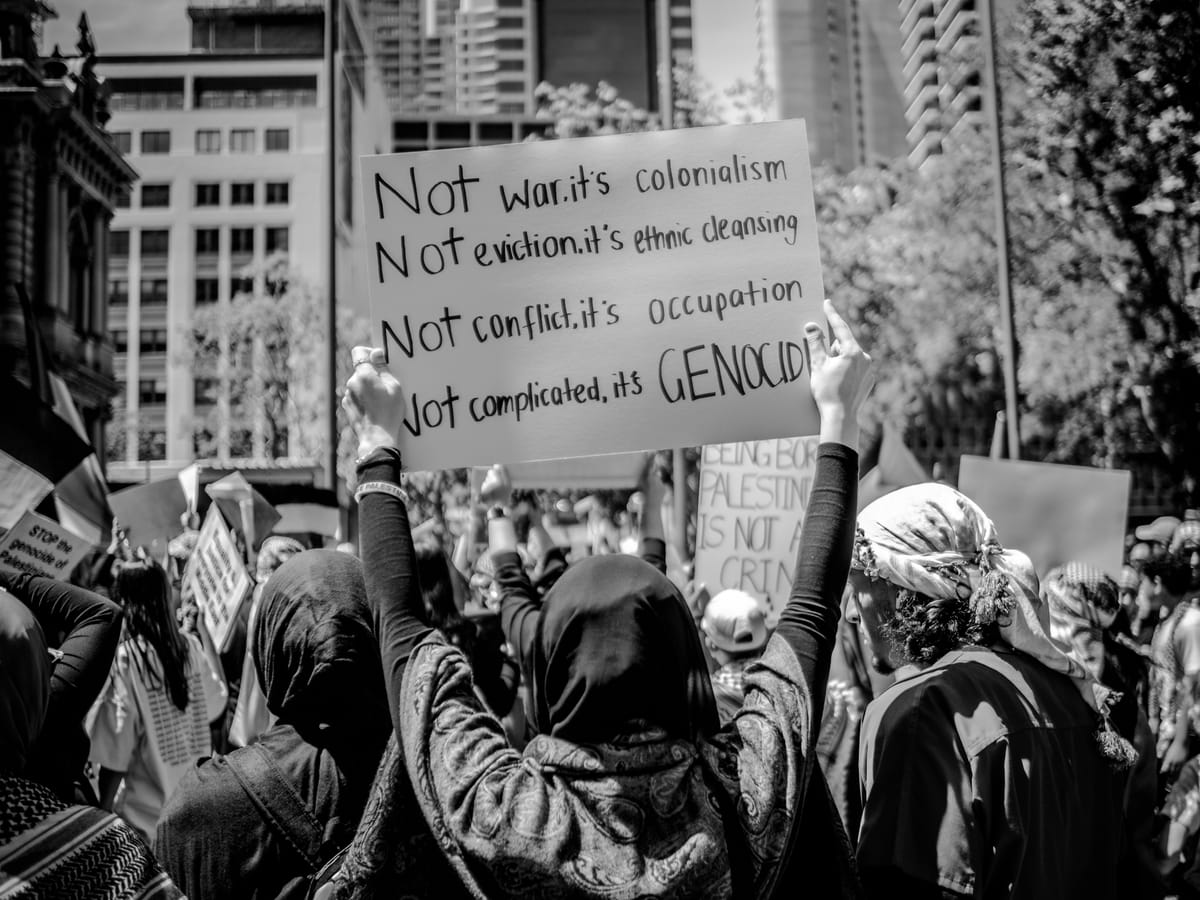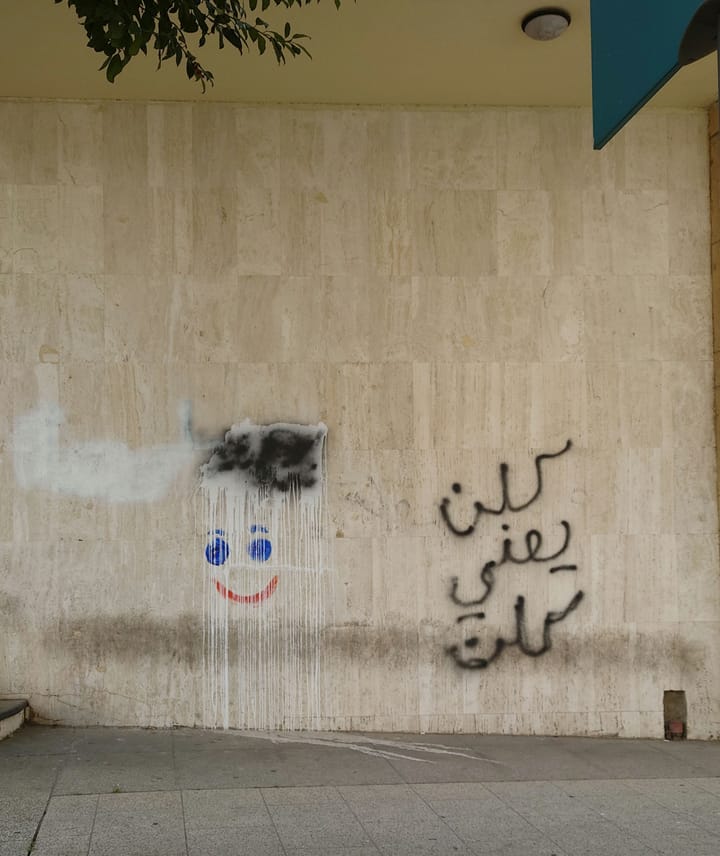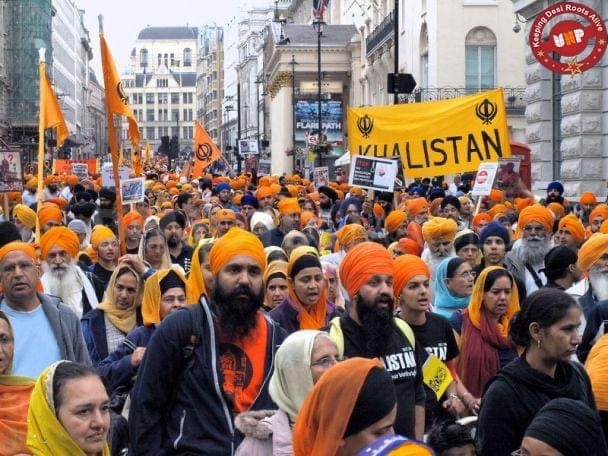Following Israel's continuous assault in Gaza and Rafah, Moneer provides an exclusive account of his life in Gaza upon the destruction of his university as well as surviving amidst war-torn conditions.
Listen to the interview:

Transcript
Can you tell us a bit about yourself?
I am Moneer, a 22-year-old Bioengineering at the University of Palestine. I used to work as a web developer for a company from Saudi Arabia. During the war, I am now doing freelancing since I lost my job. I live with my family, I have 2 brothers and 5 sisters.
How is your current situation with electricity, water and food supply?
Well it's a little bit complicated, but let me speak about electricity first. Basically, we have had no electricity since November 2023. But personally, because I need electricity to work – as I said I work as a freelancer – I bought a solar panel 3 months ago and now I have enough power to use my laptop at least 8 hours a day to do my work. The Israeli army intentionally targets people who have large solar systems that could potentially help people. If you have a large solar system to power up cooking [appliances], refrigerators, you are basically putting yourself in danger.
‘We have had no electricity since November 2023’
For the water, it’s actually the hardest part. I think they are using water as a weapon against us. Since the beginning of this war, the Israeli army has shut down all of the water supplies to Gaza and prevented fuel from entering Gaza, so we couldn’t farm our lands. So back then we used unclean water for everything, and we had to walk for long distances and wait for hours to get very little undrinkable and unclean water that won’t be enough for a whole day. But later on, they actually allowed some fuel into Gaza so things got a little bit better. We would have water 1 day a week, or 1 day every 2 weeks. We stored water as much as we could but unfortunately, it only lasts for so long. 15 days ago, I think, they bombed the town hall of my area which is responsible for water distribution and ever since, we have [had] no water. We need to walk for long distances to get our water again but at least it is clean now.
‘They are using water as a weapon against us’
About the food, you know there is an Israeli policy of destroying agricultural lands and crops that has worsened during the conflict. We generally suffer from a lack of food items at the markets and very, very high insane prices that nobody can afford. Well, here people rely heavily on humanitarian aid for food. Personally, I work and my 2 brothers work [online] so we try to buy the food as much as we can and not rely on humanitarian aid for food.
Do you feel at risk, having your small solar panel system?
No. Actually, almost everyone has a small system. It’s not actually a solar panel, it’s not a complete system – I had to do some work to get it running. Everyone has one; I’ve never heard of someone being targeted or bombed for having a small solar panel system. Some of them (houses with full solar systems) get bombed, some of them get a small rocket that destroys the solar panel without any mass destruction.
Right now you have to collect water from far away every day?
Yeah, because they bombed the town hall responsible for water distribution. It's not very far away now, I think it’s like half an hour on foot. Me and my brother go 3 times a day; everyone gets 4 gallons [15 litres] of water.
Can you tell us about the flour rationing before Ramadan?
At some point flour just wasn’t there, it didn’t exist in Gaza. At that point, UNRWA was our only source of flour, humanitarian assistance for everyone to get flour. You had to wait 4 hours; you could go 2 or 3 times a day and still not get flour. But alhamdullilah now flour is available and everyone gets to buy it. [Now] some days we have food like meat and vegetables but most of the days it’s just canned food.
UNRWA was the only organisation in charge of the distribution of flour for the people in Gaza. Because many people have been displaced from northern Gaza to the south, many of them use UNRWA shelters for safety. So in [central] Gaza, there is a distribution point in Nuseirat. It used family numbers as a mechanism of distribution. For example, in the first week, it targeted families with more than 9 members. As a big family – we are 10 members – we had to go every day to Nuseirat. At the beginning, we went at 8 to 9 am in the morning to wait for the entire day but we could not even get close to the gate. So the next day we tried to go much earlier, like 6 am, and still didn’t get a chance to get close to the gate.
‘...we tried to go much, much earlier at 4 am [...] It takes an hour on foot to go to Nuseirat (UNRWA Flour Distribution Point)’
Queues for UNRWA Flour Distribution early in the morning at Nuseirat, Gaza / Video: Moneer Mizyed
Later we tried to go much, much earlier at 4 am, praying then going immediately to Nuseirat. It takes an hour on foot to go to Nuseirat. Many people are waiting there [at this time]. If you are lucky you would most probably reach the gate at 11 am. If you are lucky there will still be flour for everyone and they would give you a card. As I remember, we had to go there 8 times in a row. My brother tried to spend the night there but still didn’t get flour, they said they didn’t have flour that day. As I said, if you were lucky enough to get the card you would have to go to another place and wait in a very long queue to get the actual flour.
If you don’t mind answering, were you ever afraid of starvation at this point?
Actually, yes. Especially 4 months ago when the Israeli army invaded Khan Younis. If you don’t know, Khan Younis is right between Rafah and Deir el-Balah where I live. As you know Rafah is the only place where humanitarian aid comes from – the only entrance from Egypt. When the Israeli army came, the way between Deir el-Balah and Rafah was shut down for weeks. We suffered from a lack of food. Actually, there was no food, just some canned food. We did go through some starvation but it didn’t last too long, maybe 2 weeks before they decided to re-open the route between Rafah and Deir el-Balah. If at any time the Israelis try to invade Rafah or Khan Younis again and shut the way to Deir el-Balah, we will probably face starvation again just like what happened in northern Gaza.
What are your views on the humanitarian air drops by countries such as the US, many of which fell into the sea and exposed people to deadly conditions?
It’s an unhumanitarian way to give food to people, especially starving people. It’s actually very dangerous: it falls to the ground at very, very high speeds that could potentially break your bones or kill you. [Because] people have very little and are trying to feed so many others, everyone starts screaming and fighting and most of them won’t even get anything.
As someone born and raised in Gaza, how do you compare this conflict to the others you have lived through in your lifetime?
It’s actually 5 major conflicts between Israel and Gaza [since my birth]. I actually remember the first one, the conflict that took place in 2008 between Gaza and Israel. I was 6 years old back then, but I still remember everything. As someone who has lived and grown up in Gaza, I would like to tell you it’s unfair to compare this conflict to any [before]. It’s not even fair to call it a ‘conflict’ or a ‘war’, it’s a genocide and a mass destruction of the population that violates all human rights, international law and humanity that people have been fighting so long for. Entire neighbourhoods have been destroyed, wiped out of existence – mass killings in the most traumatic way you can imagine. Torture and displacement of entire cities – it’s not a war, it’s a genocide.
‘Entire neighbourhoods have been destroyed, wiped out of existence’
What personal losses have you suffered?
Everyone has lost something. Speaking for myself, I lost some of my cousins, some of my family – my aunt, my aunt’s husband. I actually lost 2 friends, I lost a friend a week ago, a very close friend. My university got completely destroyed – no signs of it being a university [anymore]. [Regarding] my job, I lost a part-time contract with the company I used to work for.
Even if this genocide stops today, I won’t be able to complete my studies even next year. Entire cities are wiped out. Maybe I still have a home, but many other people’s and my university is completely destroyed. Networking and communications in Gaza are completely destroyed, it will need at least 2 years to rebuild so I can complete my studies.
‘Everyone has lost something.’
Can you tell us about the mental toll of the conflict?
I suffer from depression, and have a hard time sleeping, staying up thinking, “What are we going to do after this war and how are we going to complete our studies? How will I get to work again? How will I complete my life without so many people like my university friends – how am I going to live without them?” Yeah, I still have hard times and [feel depressed every time] I think about it even though I’m 22 now. Sometimes I spend all night staring at the ceiling thinking about how the next day is going to be.
Some of my friends suffer from severe mental issues. My friend’s whole body would shake if he heard an airplane, or a strike or a bombing. His body would start shaking so hard as if the bombing was happening right in front of him [although] it was far away. [I hear bombing] yeah, every day. It’s actually been a very hard week because they are targeting [my area] Deir el-Balah intensively.
‘Sometimes I spend all night staring at the ceiling thinking about how the next day is going to be’
At what point did you decide you wanted to leave Gaza?
Unfortunately I cannot afford to leave with my entire family. We love Gaza. Well, I decided to leave when my university announced that it was abandoning its professors – it said it won't be able to give salaries or financial support anymore. Technically it means my university is bankrupt and, as the new [academic] year is starting soon, I need to complete my studies as soon as possible. As the oldest brother I usually feel in charge after my dad and I need to complete my studies and find a new job to help my family financially.
If I manage to go to Egypt it would be a great opportunity for me to complete my studies. I won’t be wasting time anymore, I could get back to my job or find a new job as a web developer or freelancer and give financial support to my family in Gaza. It’s against my choice: I hoped I could complete my studies here. I wish I didn’t need to leave Gaza to complete my studies but still, I think there is no way to live in Gaza for at least the next few years.
‘I think there is no way to live in Gaza for at least the next few years.’
At first, my parents didn’t [support me leaving]. But I showed them how my university got destroyed and how they are abandoning the professors and refusing to pay their salaries. So they actually [decided to] support me even though they don’t want me to leave Gaza. They know they have no other choice but to support me and my brother.

For those who don’t know, what is the procedure like to cross Rafah into Egypt right now?
It actually costs $5,000 just to get registered and you might have to wait up to a month. If you want to leave quicker you would pay $7,000 so you could leave in 1 or 2 weeks. If you pay $10,000 you are leaving in a week. The more you pay, the quicker you leave. Yeah, many people have managed to leave Gaza. Some people [crossed] with a few hundred at the beginning of the war when everyone [outside of Gaza] was emotional about the war and helped generously. So many people managed to leave Gaza and study in Egypt or Turkiyë.
Farhan Ahmad is currently collecting donations for the evacuation of Moneer Mizyed to Egypt from Gaza. We would greatly appreciate any donations and sharing of the fundraiser.
By Farhan Ahmad
Disclaimer: The views expressed in this article do not necessarily represent those of The PublicAsian.






Comments ()